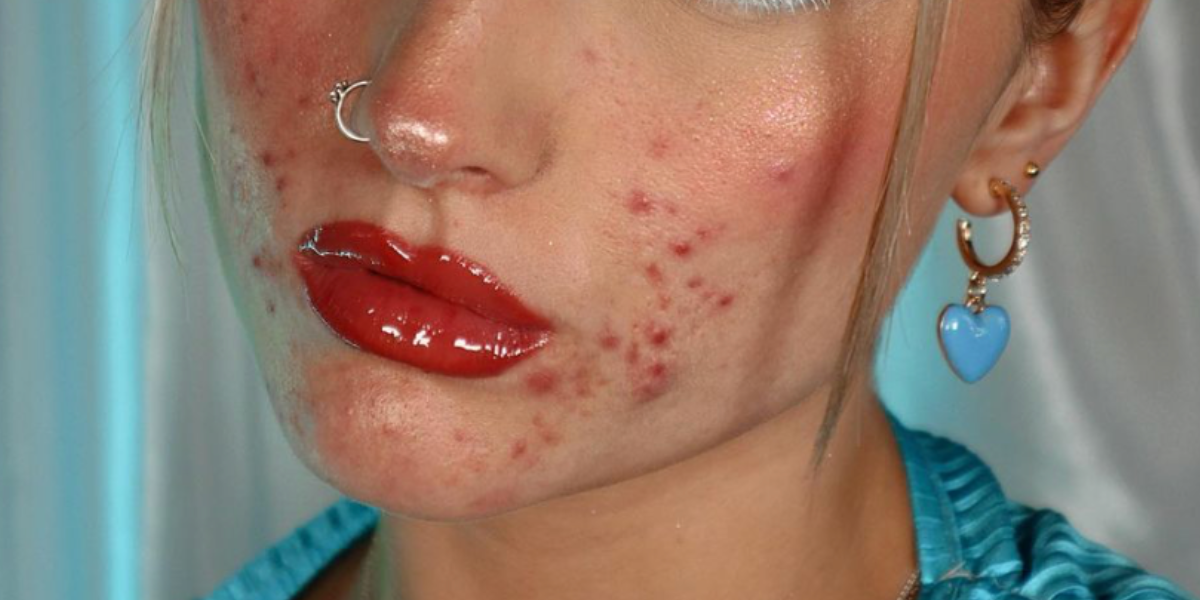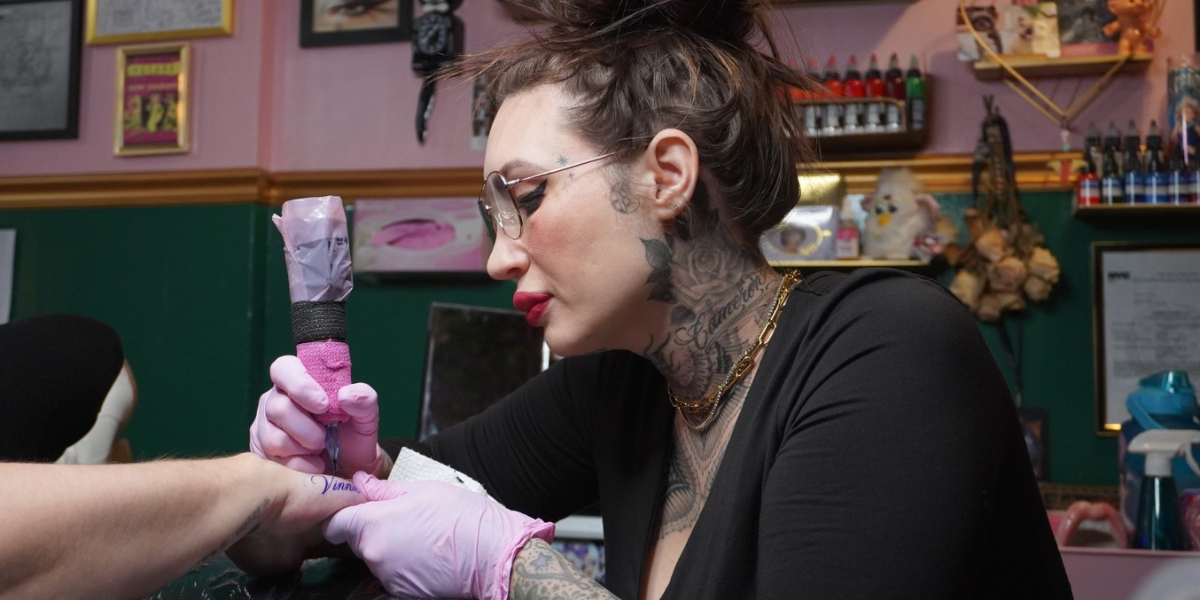Acne positivity feature image from Izzie Rodgers’ Instagram
When I was growing up in the late 90s and early 00s, adolescent TV was overrun with fear-mongering about acne.
Bright blue and white commercials for Proactiv. Ads for grapefruit cleansers that tore the first layer off your skin. Cover Girl’s pressed powder discs that were made skinny enough to fit into a clutch bag.
I’ve struggled with my skin since I was about 14, fighting pain, social stigma and literal blood and pus. At times, it’s deeply affected my confidence and my mental health. I’ve felt unprofessional and unclean. I spent more than a few special events – most notably my own college graduation – trying to avoid photographers.
A couple of years ago, I had a handle on the acne, and was just dealing with dryness and redness. Then I started on testosterone. Now, I’m back to dealing with jawline acne while maintaining a three times a week content posting schedule. If you’re a fan of one of my podcasts, you’ve seen my sad, flaky attempts at concealing my bumps.
So I was gagged when last week, gay Tiktok king Chris Olsen posted multiple videos with a big splash of ringworm on the side of his face. In one talking about depression, he jokingly shared his acne spots, his eczema, and his dandruff – before settling on a close up of the ringworm.
Instead of shying away from his camera, Olsen regaled his more than 12.8 million person audience with the tale of how he got the rash and how he was treating it. The red swirl could have easily been hidden with makeup, especially since he was headed to Taylor Swift’s Eras tour. (An event that I assume Swifties care more about than their own college graduations.)
It was one thing to show followers his blemishes, it was another to take it out to a big show.
Acne as Activism
Why not? In my journey of self-love, I fight my internalized transphobia and embrace my body. Why not also my acne?
As a trans guy, I could either be hyper nervous about the details of my appearance or I could accept that I’m never gonna look like society’s ideal. I’m gonna stand out just by being queer. I’m going to look young right now. Peach fuzz and pimples. What does anyone expect? I’m on hormones! My awkward second puberty is a sign that I’m taking big swings to live the life I want.
Obviously, this isn’t an endorsement of stopping our skincare regimens! But in a world where we can’t control anything anyway, does problematic skin mean we have to hide ourselves away like the Phantom of the Opera?
Perfection is out. Being transparent about using filters and Photoshop is in. Talking neutrally about your body, without the quirky Millennial self-deprecation is on the rise.
I started following ladies like Beth Cooper and Maia Gray on Instagram, which has eased my acne-induced depressive cycles and the conflation of my skin with my worth as a human. These creators position their work on “anti-acne shaming” as the same as “anti-bullying campaigns.” They’re not just “acne influencers,” they’re “acne positivity” accounts. It’s activism.
Comfort in your skin is a rallying cry of being queer! Model Cassandra Bankson credited coming out as a lesbian with clearing her cystic acne. She’d covered her acne since middle school to avoid bullying, and equated that with being in the closet. I don’t really believe in the correlation, but maybe when you’re not operating from a feeling of panicked hiding, you can actually focus on letting those pores breathe.
Acne as Fashion
I’d take it a step further. Showing your “real skin” isn’t just about ignoring your blemishes or letting your skin be bare but still smooth (so brave!). It’s about embracing acne, uneven texture, and redness as “part of the lewk.”
Turn your textured skin into art by adding fresh flowers, gems, and sparkles like digital creator Sofia Grahn. Do “foundation free” make-up looks like Izzie Rodgers with bright and meticulous eyeshadow and lips, acne on full display. Lean into your scars and hyperpigmentation like influencer Simphiwe Mbatha. Even Euphoria’s make-up team was told to keep actress Barbie Ferreira’s cheek breakouts uncovered as part of the character’s wardrobe.
And if you don’t want to show actual acne, the famous’ are now decorating it with cutesy rainbow pimple patches. Pimple patch companies used to compete for how invisible they could be, but teen mags have started calling those visible, colorful pimple patches the new must-have accessory. Hell, in January, Madison Beer, one of the hottest queer women in pop music, did press for her new single with multiple visible star pimple patches across her forehead and chin.
At 36 years old, contending with cystic acne should be value neutral. I’m a normal person and normal people have pimples. That’s all. I’ve never met a friend for a drink and thought, “Ew, they have bad skin. I wish they hadn’t come.” And (probably) no one’s ever thought that about me.
I grew up ashamed of my acne, so I’m down for society to overcorrect. It’s time for us to love our skin.








Comments
“without the quirky Millennial self-deprecation”
Ouch, I’m feeling called out 😉
(Also what, Madison Beer is queer? Granted I only know her work for KD/A, but I still feel like I should have known that)
Yes, this is a good trend and a good article, thank you. (Even if I do have the easier transition hormones for pimples, I’m guessing you probably do less hair removal so I have more ingrown hairs…)
ooooof ingrown hairs are demons!!
i just started having ‘bad’ skin after a lifetime of dewy beautiful glowy blah blah blah skin. its been bumming me the fuck out, but this was nice to read. i have invested in some cute pimple patches and ive been tryinggggg to not stare critically at the redness and the pimples when i look in the mirror, instead i try to look at my whole face, as a sum of its parts. like…sure my skin is spotty and red, but my eyes are still pretty and my lips are still pretty and like…we don’t usually stare JUST at the imperfections on someones face, we take in everything. thats what im trying to tell myself anyway…
Oh I love that. We do look at the whole face. And we look for friendliness and openness and body language too.
The coming out clearup story is interesting to me because I’ve been confronted the past few years with just how bad stress can be for your body, physically. Three cheers for all kinds of self-acceptance and living well on your own terms!
I know, right? I want to be value neutral about it because the assumption that acne means someone has something to hide is a slippery slope…
Thanks for this post and spreading positivity.
Yes I totally agree with you. Plss normalise having acne.
This is well needed post. Thanks for the positivity.
hey
I’ve been dealing with ongoing joint issues and came across Arthrogenix as a potential solution. Has anyone here used it to help with joint discomfort or flexibility? I’m curious about whether it truly lives up to its claims. Would love to hear your feedback!